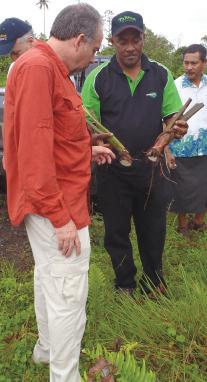Fiji-Australia bilateral talks
 PHAMA countries have traditionally been poorly resourced to engage in technical market access discussions with major trading partners such as Australia and New Zealand, let alone with their smaller Pacific neighbours.
PHAMA countries have traditionally been poorly resourced to engage in technical market access discussions with major trading partners such as Australia and New Zealand, let alone with their smaller Pacific neighbours.
Routine, programmed engagement at the bilateral level is an essential part of managing trade issues and maintaining the focus of trading partners on the longer-term market access priorities of a particular country.
To address this, PHAMA is providing technical support and training to improve PIC capacity to conduct bilateral market access discussions with selected trading partners, and is also providing some logistical support. Emphasis is placed on raising the awareness of PIC governments of the need for structured discussions to take place regularly, and to match this with appropriate budget allocations.
First cab off the rank was Fiji. The Program supported bi-lateral discussions between Biosecurity Australia and the Biosecurity Authority of Fiji in mid-November, held in Fiji. In addition to formal talks, field-trips were conducted to Taveuni (to review first-hand the taro export pathway, where PHAMA and the Australian Centre for International Agricultural Research (ACIAR) are currently working together to address quarantine and non-quarantine issues), and to the Yasawa Islands (to review fruit fly surveillance operations).
PHAMA helped with the preparation of briefing papers, pre-visit coaching on how to conduct negotiations, and logistical support.
A major gain for Fiji from the discussions was an agreement to reduce Australia’s fresh-fruit sampling regime for papaya exports, and in principle agreement to allow loose consignments of papaya in aircraft.
Both of these concessions will result in significant costsavings for Fijian exporters. But the most important achievement is that, after a pause of more the five years, Fiji has re-initiated bilateral consultations with Australia, and is already considering who they will meet with next and what might be on the agenda.
Support will be provided for the remaining four PHAMA countries to hold bilateral discussions with a country of their choice over the first half of 2012.

